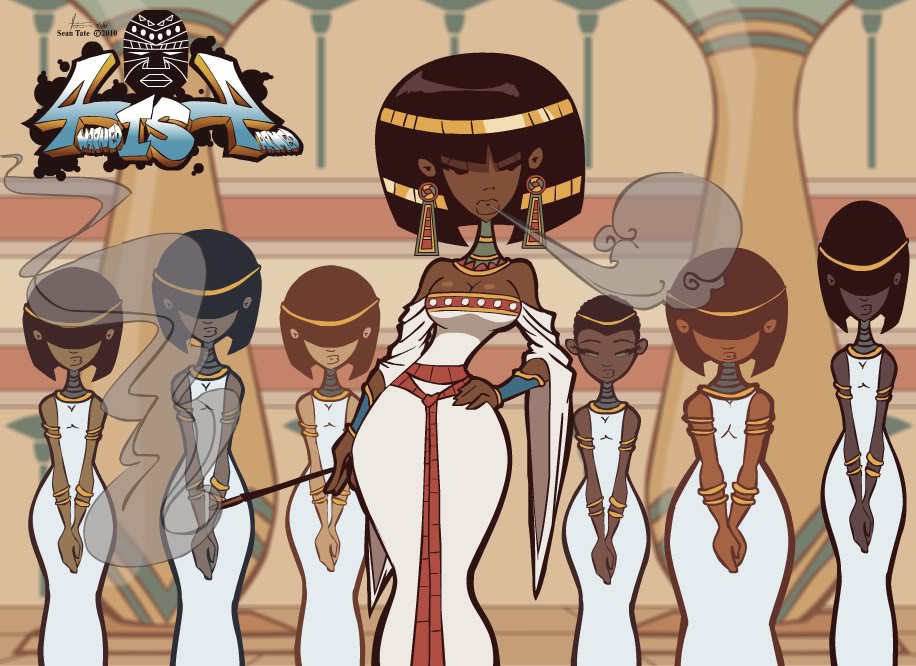The ancestral shrine is one of the simplest to create, and to honour one's Egun/Ancestors is not dependent on any spiritual tradition, although practicing a spiritual tradition gives you a wider range of tools and specialised language with which to speak with, honour and include Egun into one's daily lives.
For African people's this is especially important given the times we live in and the horrors imposed on us as a people by the slave trade and colonisation.
In his book, Ancestors: Hidden Hands, Healing Spirits for Your Use and Empowerment, Ra Ifagbemi Babalawo, he writes that until there are 1 million ancestral altars built and maintained by the sons and daughters of former slaves, the tide of dissipation that exists within the 'New World' diaspora will not stop.
Think about it. So many African-Americans, Afro-Caribbean people say that 'slavery done and finish and don't have nothing to do with me now'. In effect they are spitting on the tremendous suffering that existed during this horrific unjust period in history. They are saying that the sacrifice of millions of our mothers and fathers means nothing, meant nothing and is of no importance.
It is no wonder that no effort to elevate modern day Africans has succeeded. Without the blessing and inclusion, the veneration of those souls who lived through that hideous time, not only will the overall plight of our people not change, but will likely get much worse.
We must begin to honour our Egun, because through them our people prospered for generations and through their sacrifices we are here to live, breathe and enjoy our lives. The Yoruba have a saying, "We stand on the shoulders of those who went before." Yes mistakes were made, but we cannot continue to hold our Ancestors to ransom for the corruption and hatred of one culture against a next. Unless many prayers and rites are done for the dead, they will never find the peace they ultimately deserve and we will not justify the awful sacrifices that they had to make on our behalves so we could prosper and LIVE!
What mother does not sacrifice for their children? What father does not struggle to provide the best possible opportunities for development and growth for his children? So it is going back along the long line of our ancestry. All of the Ancestors who lived a good life and tried to do God's work and who now sit at God's feet in heaven, wish the best for their descendents.
Ifa-derived traditions believe that Egun reincarnate within their bloodlines. So now you sit, you are a former slave come again; you are a slave master come again; you are a hunter gatherer from 80,000 years ago. You come again to seek enlightenment, to learn from your mistakes and to set things right where possible.
So to honour the Egun, and to open one's self to the many blessings Egun would heap upon us, one creates a special space for them and say prayers for them. This is the focus point, the meeting place between this world and the next, between one generation and the next, between souls across space, time, life and death.
In Ifa-derived systems, creating Ancestral shrines are often very personal and differ not only from tradition to tradition (Candoumble/Santeria/Lukumi/Shango/Umbanda) but from house (ile) to house.
If one is not a part of an ile, it does not exclude you from being able to create a shrine and honouring your ancestors. However, you should be careful as one cannot just invite ANY Ancestor to come. Would you invite the slave master great-great grandfather who raped and beat your great-great grandmother? Would you invite a child molester in your family?
One of the reasons we allow the Elders to guide us in creating an Ancestral shrine is it helps us to make sure that no negative Eguns come and take up residence. This would not be good for you or for them.Special prayers need to be done for those Eguns who did not live good lives.
The simplest ancestral shrine consists of a glass of fresh water and candle. Sometimes no candle is necessary. I give my Ancestors coffee in the mornings because that is traditional, but also because on both sides of my family there were big coffee drinkers, such as I am.
My grandfather, now an Egun himself, and I used to sit together in the mornings and drink coffee and sing hymns. In a way, my morning offerings are a continuation of this. It is also a continuation of my Coffee Friday rituals with Keffi. I have a special cup I give them coffee in, because it is said you do not feed the dead with the dishes one feeds the living.
On my make-shift shrine, I keep a hundred year old wooden box once owned by my great-great grandfather Etienne Bellerand. I keep the hymn book my grandfather and I sang from. I keep photographs of my maternal great-grandmother and paternal grandmother. I keep a little bit of efun/cascarilla (ground egg shell). I keep some of Keffi's hair there as well, because I honour her as an Egun since she left babies behind.
These are their personal items I hav gathered and form the basis of my personal shrine for my ancestors, but each one has a bit of their essence and hence forms an attractive force to them, as these are easy objects to focus on as they are familiar with them already.
I spread a white cloth under the space, because white represents purity, and is a colour attractive to the Spirits. Lighting candles attracts the Engu's attention, as all light is attractive to the Spirits.
I keep some Florida water and Kananga water there as well as these are used to sweeten the air, and occasionally Egun ask for some in their water. I also have incense that I burn for them: Seven African Powers, Three Kings, Frankincese, Benzoin etc.
I also keep my Tarot cards there as they are the best ones to look after them when I am not using them.
Traditionally in Ifa-derived systems, one offers the Egun a little bit of everything you cook for yourself. Also once a week it's a good thing to cook a special meal for them. If you know how to divine, it's good to ask them what they want.
My Egun always want baked chicken and rice and peas, with mauby. Occasionally they ask for something else, but for the most part, that's their standing order. The only thing one MUST remember when cooking for the Ancestors is to use ABSOLUTELY no salt. Salt chases away spirits, so to put it in the food is to repell them.
In terms of my personal experience with the Egun, I have had them manifest in the flesh and heal my body; they have thrown a protective shield around me more times than I can tell you here, and most recently they are at the root of my getting this job, moving down to Fulham where I am now alone for the first time since I've been in England. They will help me to find a good flat, and lead me to the right teacher so the best part of my life can begin.
As long as I don't forget them, they won't forget me. It's all about reciprocity.
I know this isn't an academic explanation of why Ancestral veneration is important, and what goes into a shrine. But I am in a cybercafe at the moment, and cannot write a truly complete answer. In any case, there are a number of books that can do more to explain what Ancestral veneration is and about building a shrine. The book I mentioned earlier is an EXCELLENT place to start and is available from Amazon.
----------
LIBATION (AKA MOJUBA)
Omi Tutu
Ona Tutu
Ile Tutu
Ori Tutu
Tutu Esu
Tutu Orisa
Tutu Egun Mi
Tutu Bobo Egun Ara Orun Tiembelese Oludumare
Mojuba Oludumare
Mojuba Olorun
Mojuba Olofi Ayie
Mojuba Ibae Egun Gbogbo Egun Ibae
Mojuba Gbogbo Orisa
Mojuba Baba Alagba Osin Ati Olosin Egbe Egungun Mi
Mojuba Iya Tobi Mi
Mojuba Baba Tobi Mi
Mojuba Iyalorisa
Mojuba Babalorisha
Ki Nkan Ma Se (Godmother's name)
Ki Nkan Ma Se (Godfather's name)
Kosi Ko Iku Ojoji
Kosi Ano
Kosi Arun
Kosi Ina
Kosi Eyo
Kosi Idina
Kosi Fitibo
Kosi Egba
Kosi Ofo
Kosi Ese
Kosi Akoba
Ariku Babawa
Ariku Iyawa
Ase, Ase, Ase!
Ofo Ase, Ofo Ase, Ofo Ase
Iba se ori egun Ìlà arun
Iba se ori egun Ìwò arun
Iba se ori egun ariwa arun
Iba se ori egun gusuu arun
Iba se ori egun orun
Iba se ori egun ayie
Iba se..... (call the names of all the Ancestors you can remember and call those whose names you can't remember but on whose shoulders you stand.)
ANCESTORS BEFORE ORISHA!
Maferefun Egun!
Mojuba Egun!
Modupe! Adupe!

In any Yoruba dervived spiritual tradition, a good madrina/iya or padrino/baba will tell you, before you can start dealing with Orishas, you must first deal with your ancestors.
The reason why they say this is because Ancestors are us and we are them. Think about it. In your genetic makeup, you are the sum total of the genes in your family going back to the common mother of us all… our GREAT MOTHER, Mitochondrial Eve. The path that they opened for humanity–their children–has left us with our cultures, our languages, our social mores and our spiritual perspectives on the world.
Many people say they don’t ‘like’ history, but all that went before influences all that happens after, and there is no way to mitigate this.
Africans have ALWAYS practiced rites for the dead. Since not only archaeological evidence but now genetic evidence as well proves that life spread out from Africa, our rites for the dead are embedded in our understanding of our lives in the world. All cultures practice some form of Ancestral veneration, even it doesn’t initially seem that way.
Catholicism and hence almost all subsequently derived Jesus Christian tradition have their saints or the respect they pay to the founders of their particular flavour of Jesus Christianity, all of whom are deified Ancestors.






Add comment